The post This Is Russia appeared first on The Expeditioner Travel Site.
]]>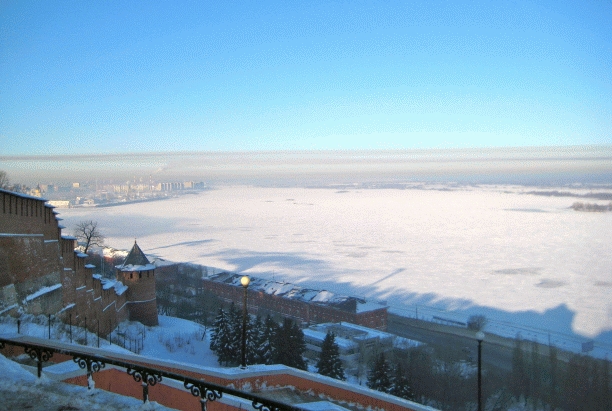
Nizhniy Novgorod, Russia — mid-January or early February. It’s dark and the temperature is somewhere in the subzero category. Seems late for 4:00 p.m. My eyelashes clump, heavy with frost, and my glasses are permanently iced over. The snow seems to be falling at a rate of several inches per minute. Square wooden shanties sit on the hill to my left like squalid gingerbread houses, lost in heaps of grayish icing. On my right, a few Soviet-era apartment buildings cast warped shadows across our path of drifting snow.
“Seriously you guys, where are we?” I ask, slightly exasperated but still good-natured. Riley responds with the learned nonchalance of someone who has traveled through Europe alone with little regard for personal safety, despite having acquired genital lice in a public bathroom somewhere between Switzerland and Spain.
“I dunno dude, but this is like, the sketchiest place ever. Did you see that unmarked van drive by? And check this junkyard out, what the . . . ?”
“This is Russia,” Monica offers, dryly, and we pause our marching to laugh at our new favorite catchphrase. It sums up everything so obviously, so perfectly.
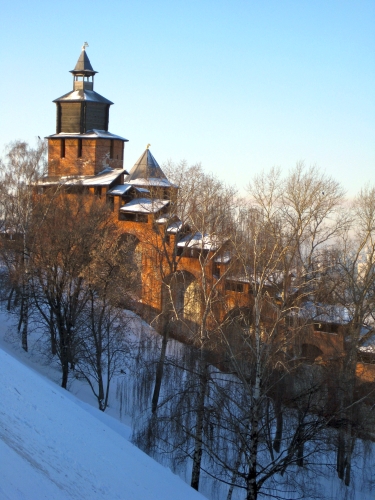
“But why Russia?” my mother had asked. “Why can’t you go somewhere else? I don’t like the idea of you living there, being a girl and everything. Russia is so dangerous.”
“I don’t know, I just — I really wanna go, Mom.”
I couldn’t articulate the appeal of existentialism and the idea of the Russian soul to my mother. She’d probably assume I was a godless, communist wreck. Plus, I’ve never been very aware of why I want what I want, I simply stubbornly insist on having it. In retrospect, I was hoping to find the Russia of Russian literature. I’d been reading Tolstoy, Pasternak and Bulgakov, and I was longing for a people who embraced suffering. Or maybe I was just an angst-ridden teenager, trying to find myself.
The first time I read Crime and Punishment, I was hooked. I was in junior high, and it was summertime. I stayed inside for a few days and experienced all of the ecstatic despair that Raskolnikov felt. I was overcome by Sonia’s forgiveness and Raskolnikov’s redemption. I remember running outside in a book-crazed stupor after finishing the novel, proclaiming my thirst for meaning to the north Idaho twilight, to the weedy pasture outside my house and the tangle of trees just beyond. I might have dramatically kneeled and kissed the earth, praying to the God of my parents and the God of my childhood, for all the forgiveness a sheltered 13-year-old girl could possibly need.
At 21, the book was initially just as energizing. I smoked skinny cigarettes and downed teapot after teapot as I understood more of the uniquely Russian details from my perch above Ploshad Gorkovo in Nizhniy Novgorod. But about halfway through the book, I no longer cared about the Russia of 19-Century Russian literature and only half-heartedly finished reading my copy of Dostoyevsky’s classic. “Sonia is pathetic,” I sighed to my host mom’s empty apartment.
Raskolnikov goes from being a crazy, relatable mess to being so Christian — so predictable and tame. The answer to his existential struggle could not be this. It could not be this faith I’d shaken freshman year. The book still had literary merit, but I had no connection to it anymore. I didn’t understand Raskolnikov’s triumph in Siberia, and I no longer felt his redemption. I was jaded. Dostoyevsky used to be Russia to me, but as I looked down at the crowd of fur coats and hats at the bus stop seven stories below me, I realized I didn’t know who Russia was or whether I liked her all that much anymore.
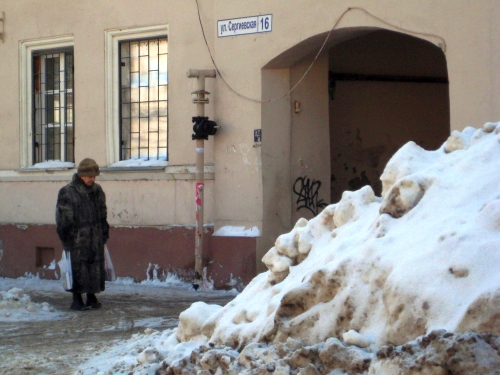
One night, shortly after my arrival in Nizhniy, I met a snarky, outgoing Russian boy named Vladimir who spoke some English. He knew I was American the instant he saw my short hair and goofy grin. He seemed both intrigued and repulsed by this, and insisted on being called Lenin to make me uncomfortable. He didn’t realize that I was not your typical Cold War kid; comparing himself to Lenin was no more threatening than encountering the real Lenin (who I’d strolled past a couple times by then, as he lay embalmed and blackening in the mausoleum).
“Ah em Lenin.” He grinned. “Zee eveel comuneest. Ah play sport of hockey an’ dreenk all zhe vodka an’ beat mah womin becus ah am from Rossia.”
He laughed but his eyes were hard and bitter. National identity is a funny thing.
Nizhniy Novgorod is situated in European Russia’s heartland at the confluence of the Volga and Oka Rivers, about 300 miles or a day’s train ride east of Moscow and two and a half days south of St. Petersburg. The city was founded a couple centuries before Columbus discovered the New World, and it was a thriving metropolis and center for merchants. Russian people used to refer to it as the “Pocketbook of Russia.” Nizhniy is still important in the region, but not the economic powerhouse it used to be. The nicest areas of downtown are just a few blocks away from rows of decrepit wooden houses with broken-out windows; not unlike pictures I’d seen of shantytowns or Hoovervilles in my history textbooks.
During the Soviet period, the name Nizhniy Novgorod, which basically means “new city,” was replaced by the name “Gorky,” because of the famous — and overly didactic — Soviet author who spent his childhood there, Maxim Gorky. Gorky was not his real name or patronymic; it is the Russian word for “bitter,” which, as anyone who has read his work can tell you, accurately describes the life of this man who grew up in pre-Bolshevik Revolution squalor.
Nizhniy has a population of over a million people and is the fifth largest city in Russia, yet no one west of Kiev seems to have heard of it. I read the Wikipedia entry before I left the U.S., but gleaned most of this information later on a tour from Russian students who were eager to explain the history of their home to me. Between 1917 and 1991, Nizhniy was closed to all foreigners. In four months, my group of 15 American students met three other Americans — two missionaries and one student.
*
It’s late April or early May. Monica, Riley and I are lost again. We notice a pile of books next to someone’s garbage can on the side of the street. Monica hurries over to inspect them.
“They’re probably smutty paperbacks,” I remark. “Don’t get too excited.”
We scoop some up at random and hurry along because we need to find our way back before it gets late. As we walk, Riley sounds out the more difficult Russian titles so we can decide which ones are worth keeping.
“Wait, is this one about pineapples? Okay, here’s an old looking one: Doctor something. Zhi-vah-go — dude! I found Doctor Zhivago!”
Doctor Zhivago had to be sneaked out of the USSR to be published because much of the material in the book was deemed anti-Soviet. This particular copy was a hardback from 1957 — the very first year it was printed by a French publishing company and smuggled back into the country. It wasn’t legally published in Russia until 1988, almost 30 years after Pasternak was awarded the Nobel Prize for Literature.
Now, in capitalist Russia, this classic work of dissident literature sits next to plastic trashcans and empty beer bottles, collecting dust and curious foreigners.
I saw Russian soil for the first time after I’d been living in Nizhniy for over three months. The Motherland — when I finally glimpsed her bare earth — was filthy. Garbage littered every muddy, slushy street and square of the city, and I had to dodge puddle water every time a bus sloshed past.
When the last of the snow melted, everything that wasn’t brick turned from mud to dust in what seemed like hours. It was alarming to see the starkness of a horizon not obscured by heaps of snow. I went for long walks by the Volga River, passing 15th and 16th Century cathedrals as well as strip clubs. Old Believer Orthodox Christians in their long, black smocks and beards walk past scantily clad nightclubbers without a backward glance.
Groups of four or five people — sometimes students, sometimes middle-aged adults — would stand just off the street, sharing a bottle of vodka. When everything was still frozen, they’d place the bottle in a bank of snow to keep it cool, then pull it out and pass it around, laughing and smoking. When it was warmer, they switched to liters of beer. The first few times I encountered these groups I was shocked, but by the second month I was joining them on their liquid picnics. Once, we crawled underneath a table in a pile of trashed furniture where we could hide from the wind and snow and talked haltingly about God between shots. Vodka is cheaper than milk in Russia, and better at warming your insides.
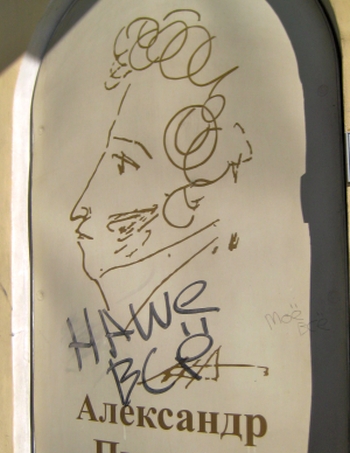
Outside of a restaurant in St. Petersburg, I saw graffiti scrawled on a portrait of Alexander Pushkin. It read, “Our everything.” I realized then that I needed to know the Russia of today for who she really sometimes was: the Russia of disillusionment; the Russia of corruption, alcoholism, depression and early death. The Russia who threw Pasternak out like trash while her delinquents scrawled literary references instead of expletives on the walls of their cities. The Russia whose suffering is becoming a new literature.
While going to Nizhniy Novgorod State University, I learned Russia had the highest literacy rate in the world during the height of the Soviet Union. My Russian friends could quote Pushkin, Chekhov, Tolstoy and Dostoyevsky without hesitation. How many American students could quote Whitman, Melville, Fitzgerald or Emerson without being called pretentious assholes?
I taught American history to university students so that they could listen to a native speaker and practice English vocabulary in their field of study. There was one student, Sasha, who always sat in the front in pressed suits. He treated me like an ignorant foreigner most of the time, muttering what I assumed to be insults under his breath. The rest of the students generally found this quite funny, avoiding my eye contact as they giggled. On the last day of class, he approached me, blushing.
“Maybey not all Amereekans are bahd.” He shrugged, looking at the floorboards.
I wanted to hug him but I think my face remained mostly emotionless as I responded.
“Spasibo, Sasha.” Thank you.
By Crystal Stuvland

ABOUT THE AUTHOR
 Crystal is just another twenty-something kid from the woods of north Idaho who recently fled the country to live and work in Ecuador. When she’s not running from one adventure to the next, she tries to understand and write about the life of a wayfarer. Read about her misadventures and musings at Simplyontherun.Blogspot.com.
Crystal is just another twenty-something kid from the woods of north Idaho who recently fled the country to live and work in Ecuador. When she’s not running from one adventure to the next, she tries to understand and write about the life of a wayfarer. Read about her misadventures and musings at Simplyontherun.Blogspot.com.
The post This Is Russia appeared first on The Expeditioner Travel Site.
]]>The post Top 5 Countries For Teaching English Abroad (That Aren’t in Asia) appeared first on The Expeditioner Travel Site.
]]>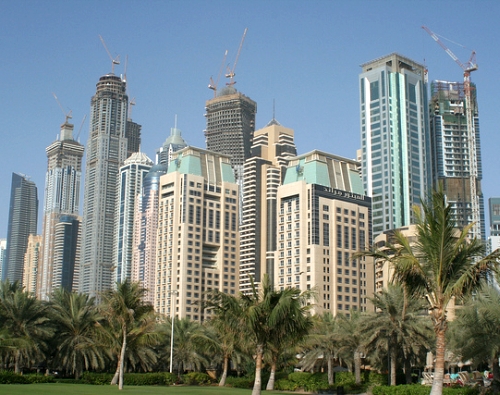
When it comes to jobs teaching English abroad, South Korea and Taiwan are the headliners. Teaching English jobs are easy to find, and high salaries and free housing are some great incentives to head east, but it’s not enough to lure everyone. There are a lot of motives behind your move: curiosity about a certain culture, the chance to learn a new language and the opportunity to experience the local community as an insider.
Asia won’t cut it for everyone. Whether you have your heart set on living in a Spanish-speaking town, or want to immerse in an Arabic community, here are five popular countries for teaching English abroad.
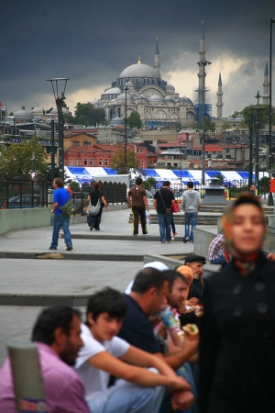 1) Turkey
1) Turkey
This Muslim nation is literally the meeting of two worlds. Stand on the west side of Istanbul’s Bosphorus bridge and you’re in the “old city” of Middle East streets and squares. Cross the river and you’re on the European continent. Istanbul, which is Turkey’s largest city but not its capital, is a sprawling collage of street markets, mosques and modern boulevards.
While the country is still developing, especially in its rural areas, Istanbul is as metropolitan as Brussels or Rome. Ankara, the country’s capital and second-largest city, has many English language academies and big chain schools, such as Wall Street Institute, which are also found in Istanbul. Other cities like Adana and Izmir and are other popular places to finding teaching jobs. The bottom line is to make sure to have a TEFL/CELTA certificate, as most teaching jobs in Turkey require one along with bachelor’s degree. (For more information check out teaching jobs in Turkey via GoOverseas.com)
2) Russia
There are a lot of opportunities to teach in Russia, and the opportunity to learn the language can be one of the most rewarding experiences. Russian can be challenging, but it’s one of world’s most influential languages, from classic literature to current world politics.
Due to Russia’s strong role on the world stage, there is a strong desire to learn English here. Adults and children (for the most part) take extra efforts to learn the language, and there are a lot of private language schools offering classes as a supplement to their education. If you’re new to Russia or teaching abroad, it might be a good idea to work with one of the big chain schools, which sometimes offer housing assistance or teacher training.
Venture outside the large cities of Moscow and St. Petersburg, and you’ll still find teaching opportunities throughout Siberia and along the borders of Central Asia. Check out towns like Vladivostok, Krasnodar and Novosibirsk to find local language schools. If you have a TEFL/CELTA certificate, a college degree and a bit of teaching experience, you should be able to find jobs easily. (For more information check out teaching jobs in Russia via GoOverseas.com)
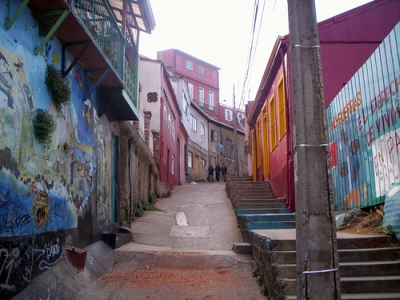 3) Chile
3) Chile
Known for its excellent wine, epic coastline and some of the most untouched wildlife on Earth, this country draws nature lovers from all over. Like most of South America, it’s difficult to arrange a job before arriving. The schools want to meet you face-to-face before hiring, so plan on going door-to-door, handing out resumes and networking once you’re on the ground.
This might sound daunting, but most people are able to find a job within several weeks. Since over 2/3 of Chileans live in urban areas, the capital, Santiago, might be your best bet for getting started, because of the high concentration of English language schools in this area.
The best jobs require TEFL/CELTA certificate and a college degree. If you prefer to go through a program, check out the English Open Doors, a joint initiative between the Chilean Ministry of Education and the United Nations Development Organization. As a volunteer, you can be placed anywhere in the country, from the mountainous Patagonia to the seaside suburbs of Valparaiso. You don’t need a TEFL certificate, and housing is provided with a host family. Don’t expect to build your savings in Chile, but it’s definitely possible to live comfortably with most teaching jobs.
4) Spain
Thoughts of sangria, siesta and sun make Spain a highly desired landing spot for foreign teachers. However, if you’re not from the EU, there’s one hurdle you’re going to have to clear before it all begins: the work visa. In order to legally work in one of the European Union’s 27 countries, you need this important piece of paper. But in order to get one, you need a formal job offer. And now the Catch-22: In order to get a job offer, the employer needs to prove that there isn’t an EU citizen that can do the job better than you. But there’s a loophole. For a monthly stipend, you can teach English through the Spanish government’s North American Language and Culture program, which automatically sponsors the visa for you.
If you want to be adventurous and just show up in Spain without a program, try looking for jobs in Madrid, Barcelona, Bilbao or Seville, which have a lot of language schools and academies. Nowadays, jobs are a bit tougher to find in Spain than they were before the financial crisis, but it’s still possible. You won’t walk away with much savings, but the memories from living the Spanish lifestyle are forever.
5) United Arab Emirates (UAE)
Want a tax-free salary? Get a job in Dubai. This city is a rapidly growing international business and tourism hub, and the demand to learn English is extremely high. Since most of the country’s wealth comes from its booming oil industry, most teaching jobs are at international corporations or universities. The vast majority of jobs require master’s degree, and usually several years of teaching experience. Compared to neighboring Saudi Arabia, women are gaining more equality and opportunities in the UAE, but the different cultural and social attitudes towards them is something that foreign women should be aware of if they are considering teaching here.
[Dubai Skyline by Ross Hawkes/Flickr; Süleymaniye Mosque by laszlo-photo/Flickr; Valparaiso by Dave_B/Flickr]

About the Author

Andrea Moran is the Director for Teach Abroad at GoOverseas.com, a community-driven website of like-minded people who are all passionate about teaching, studying and volunteering abroad. She can be followed on Twitter @Go_TeachAbroad.
The post Top 5 Countries For Teaching English Abroad (That Aren’t in Asia) appeared first on The Expeditioner Travel Site.
]]>The post Sexual Frustration And Why It Snows In June In Moscow appeared first on The Expeditioner Travel Site.
]]>
Come late spring in Moscow, just after the snow has subsided for the winter, another form of white, powdery substance blankets the capital of Russia, and it’s not what you think. The white stuff in question is called pukh, and it’s actually the pollen of the poplar tree. And when the powdery stuff is released into the air, it can be a visual site unlike any other, as well as a massively annoying allergic trigger for most, causing hospitals to become overrun with allergy sufferers and creating fire hazards all across the city (imagine throwing a cigarette butt in a pile of cotton balls).
The problem can be traced to postwar planning by Stalin and later Khrushchev who, in an effort to green an otherwise grey, concrete jungle, decided to plant black poplars throughout the city — over 400,000 to be exact — to soak up carbon dioxide and provide greenery and shade to the populace. The only problem? The trees planted were almost all female, and when female poplars — how should we put this — get in the mood and aren’t satisfied, they begin to release their unfertilized seeds into the air. And when 400,000 of them do this at the same time, you get a blizzard of sorts.
And what lesson can we take from this? Perhaps the same rules applied to first dates, leaving the maternity ward, and adopting kittens should be applied to citywide gardening projects: check the sex before you do anything else.
[BBC News]
[Photo by Svetlana/Flickr]
The post Sexual Frustration And Why It Snows In June In Moscow appeared first on The Expeditioner Travel Site.
]]>The post It’s A Bird. It’s A Plane. It’s A . . . Flying Donkey?! appeared first on The Expeditioner Travel Site.
]]>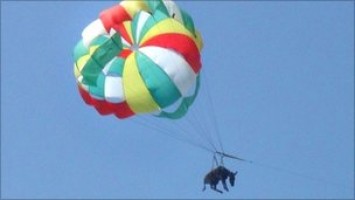
It’s not often that I’m dumbfounded by the stupidity of people. Check that. It’s not often I’m this dumbfounded by stupidity. It looks as if a group of entrepreneurs locked themselves and copious amounts of drugs in a room and vowed not to leave until they had the perfect idea to attract tourists to their private beach. What they came up with is hardly the perfect idea, but they certainly got the attention they were looking for.
The private beach on the Sea of Azov, in the Krasnodar region of Southern Russia, was the sight of perhaps one of the worst PR scenes ever. The group decided to strap a donkey to a parasail and see what happened. The BBC is reporting that an animal cruelty investigation in underway. Perhaps, when all the dust settles, a donkey-themed amusement park will both get people there, and raise enough bail money to set the owners free. The world needs more donkey-themed attractions, doesn’t it?
It makes me wonder what’s going on regarding the promotion of The Expeditioner book coming out this fall. You’ve been warned . . .
The post It’s A Bird. It’s A Plane. It’s A . . . Flying Donkey?! appeared first on The Expeditioner Travel Site.
]]>The post Where The Hell Is Sochi, Russia? appeared first on The Expeditioner Travel Site.
]]>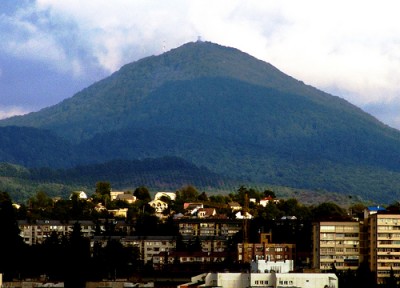
Starting to plan for the next winter Olympics? I have to admit, the closing ceremonies sent the ol’ imagination into the stratosphere with the possibilities of getting to the next Winter Games in Sochi. The thing is, I have absolutely no idea where Sochi is. Yeah, I was that guy seeing Sochi all over Vancouver, and trying to play it cool like I knew everything. I’m an idiot . . . but it’s not like Russia is a real compact country. The only likely conclusion I came up with: Google-magic. Here’s what I learned.
Sochi sits wedged between the Black Sea and the snowcapped Caucasus Mountains of southwestern Russia, near the border with Georgia. Its natural beauty, mineral hotsprings, and long stretches of beaches (like 90 miles long), make it a resort destination for Russians and eastern Europeans. But that’s enough fluff for one post, lets get serious, eh?
Trip Advisor only lists eleven things to do in Sochi, most of the natural kind (hikes, waterfalls, etc.). I’ll see if the top three tempt you at all.
- Head to the Krasnaya Polyana (Red Meadow), a state reserve boasting the best views of the mountains. The ski area here will be the site of the mountain venues for the Olympics.
- Housed in one of Sochi’s oldest buildings, the Matesta Spa sits on the top shelf of Sochi’s hot springs.
- Tour the Dagomy’s Tea Plantation, and don’t forget to buy a few bags on your way out.
My go-go-gadget internet detective skills did find something that, all by itself, would convince me to hop on a plane tomorrow: Bikinifest. In July of 2008, Cosmo magazine set a new world record of having over 2,000 bikini-clad girls spelling out the word “Cosmo.ru.” on the Riviera Beach in Sochi. That’s twice the amount of the previous world record, and two thousand times the temptation to check this place out.
I just wonder what the beaches are like in the winter?
The post Where The Hell Is Sochi, Russia? appeared first on The Expeditioner Travel Site.
]]>